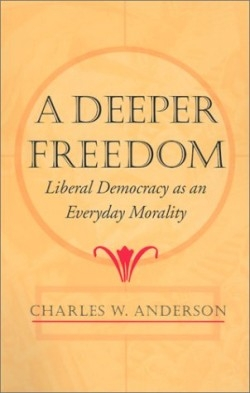A Deeper Freedom
Liberal Democracy As an Everyday Morality
“Liberalism” has come to mean a government that supports a wide array of political and social programs. In this book, liberalism is defined according to its classical meaning: a system based on personal freedom and responsibility. The author shares his vision of a liberal society and the importance of education, developed during his career as a political scientist at the University of Wisconsin. This summation is free of jargon and can be enjoyed and pondered by adult readers and students embarking on college, who may find it a helpful guide for creating a personal philosophy for these times in the wake of September 11, 2001.
The reader is encouraged by Anderson to live philosophically—not by a single doctrine, but by questioning what is worth questioning. Liberalism is “a philosophy of resistance to tyranny,” and questioning is better than sacrificing individuality to a leader or culture. While classic liberals and conservatives share a respect for tradition, liberalism doesn’t limit the quest for a good society to tradition. The task of the teacher is to know when to inform and when to let go, and the role of the student is to determine when to agree and when to question.
Teaching liberalism requires accepting several principles. These include the principle of equality—recognizing that all people are entitled to rights and respect. Secondly, people must be taught to be free and responsible. This is problematic because teaching freedom is not done through one particular doctrine. Thirdly, in a liberal society, education leads to the acceptance of individuality: we ultimately discover meaning of ourselves by seeking relationships with others. Effective teaching encourages youth to apply the lessons of their elders to their own search for identity. The final principle to be accepted is that work is worthwhile—the liberal work ethic requires citizens to be reliable and do the best job they can.
The educated citizen owes the community the best application of his or her unique talents. Those who demand that their path is the only true one should not be allowed to intimidate other citizens. Democracy is ultimately premised on the acceptance of public decisions as temporary remedies that are in need of constant revision. Anderson’s summation of classic liberalism provides a thoughtful explanation of government, education, and interpersonal relations, and offers a worthy philosophical model for reconsidering our own actions.
Disclosure: This article is not an endorsement, but a review. The publisher of this book provided free copies of the book to have their book reviewed by a professional reviewer. No fee was paid by the publisher for this review. Foreword Reviews only recommends books that we love. Foreword Magazine, Inc. is disclosing this in accordance with the Federal Trade Commission’s 16 CFR, Part 255.

